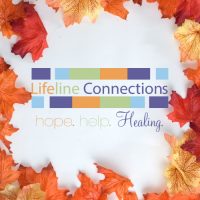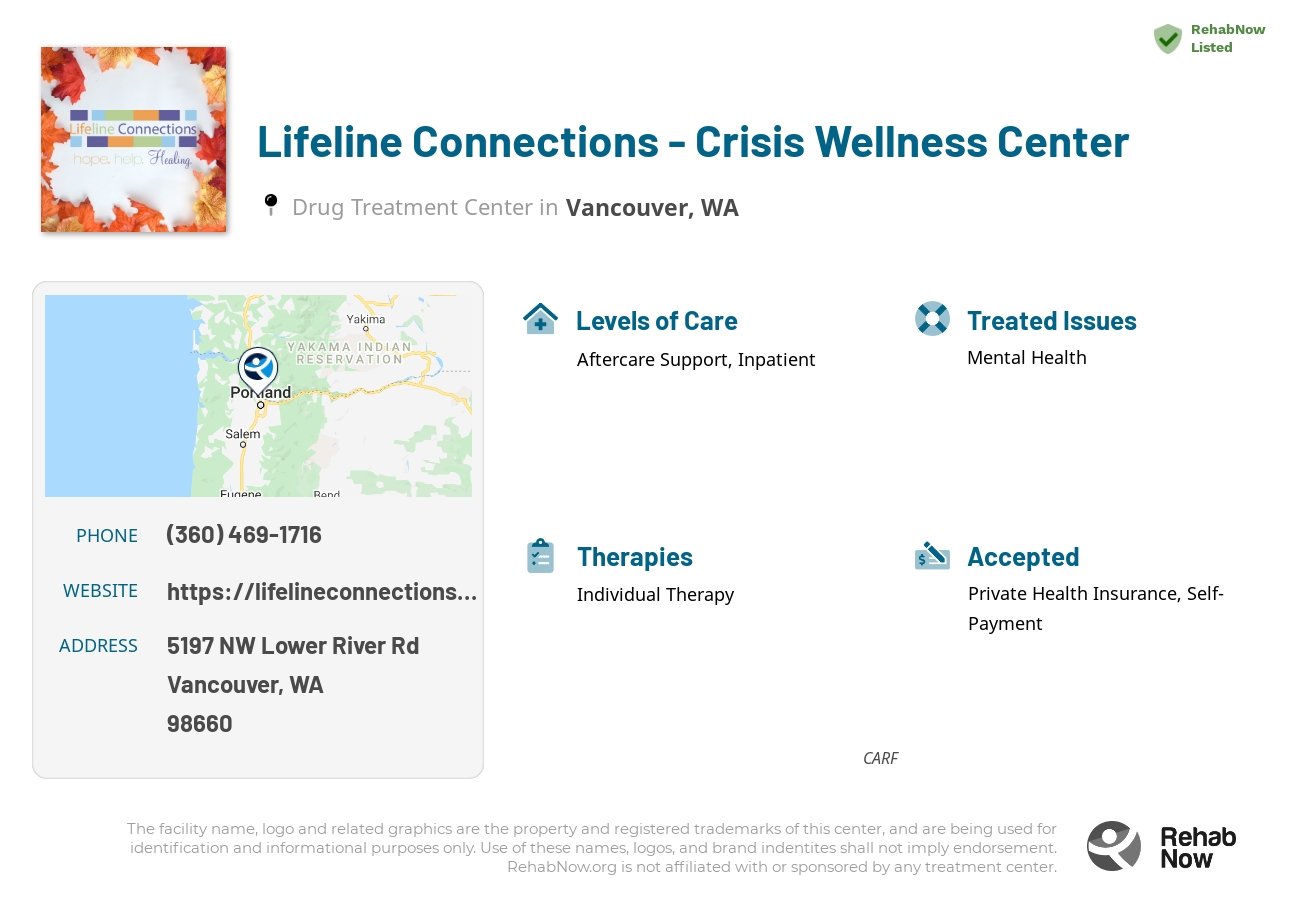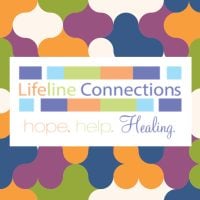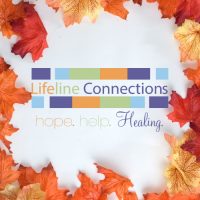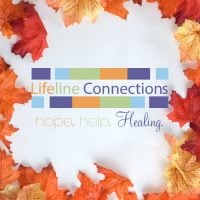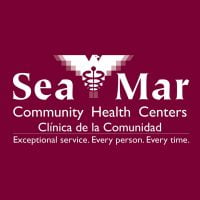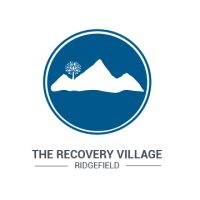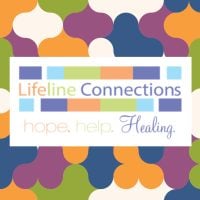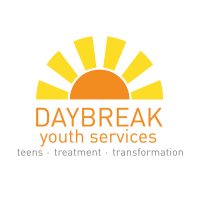Lifeline Connections - Crisis Wellness Center
Drug Rehab Center in Vancouver, Washington
Lifeline Connections - Crisis Wellness Center is a drug rehab facility in Vancouver, Washington offering a variety of services such as aftercare support, inpatient, outpatient, detox, and residential levels of care, accredited by CARF, NAATP, and the State License and accepts private health insurance.
About Lifeline Connections - Crisis Wellness Center in Washington
Lifeline Connections - Crisis Wellness Center is a non-profit rehabilitation facility located in Vancouver, Washington, specializing in providing confidential and compassionate care for individuals struggling with substance use and mental health conditions. Their primary focus is on treating mental health issues.
- Offers a range of comprehensive treatment options tailored to individual needs
- Provides personalized care and support throughout the recovery journey
- Utilizes a holistic approach to address addiction and co-occurring disorders
Lifeline Connections is accredited by reputable organizations such as CARF, NAATP, and holds a state license, ensuring adherence to high standards of care. Their services encompass various levels of treatment, including aftercare support, inpatient and outpatient programs, detoxification, and residential services.
Lifeline Connections - Crisis Wellness Center is dedicated to treating individuals suffering from drug addiction, alcoholism, dual diagnosis of mental health disorders, and other substance use disorders. Their evidence-based treatment methods and experienced professionals aim to help individuals achieve long-term sobriety and improve overall well-being.
Genders
Ages
Modality
Additional
Accreditations
State License
NAATP

CARF
The Commission on Accreditation of Rehabilitation Facilities (CARF) is a non-profit organization that specifically accredits rehab organizations. Founded in 1966, CARF's, mission is to help service providers like rehab facilities maintain high standards of care.
Conditions and Issues Treated
Levels of Care Offered
This center offers a variety of custom treatment tailored to individual recovery. Currently available are Aftercare Support, Detox, Inpatient, Outpatient, Residential, with additional therapies available as listed below.
An addict may have to go through alcohol or drug withdrawal. While detox may be uncomfortable, it is not life-threatening. Detoxification allows the addict to rid the body of all traces of drugs or alcohol and gives the addict a clean slate for their recovery. In an inpatient or outpatient setting, detox can be managed medically.
Inpatient treatment for alcoholism or drug addiction is an option that provides the addict with a supportive environment in which they can stop using. This type of treatment is appropriate for addicts that are most in need of intensive care and supervision. This includes those who were unable to quit on their own, those who need more structure than they can get in outpatient treatment.
“Outpatient treatment is ideal for those who have a lower intensity addiction. It’s also suitable for those with a supportive environment and those on a tight budget.
Outpatient treatment can be considered the lowest intensity level of addiction treatment. It is ideal for early phase addiction or lower intensity addictions. It may involve weekly sessions instead of daily. Peer group support, 12-step programs, and individual counseling may still be used and anti-addiction medication.
Residential treatment programs are those that offer housing and meals in addition to substance abuse treatment. Rehab facilities that offer residential treatment allow patients to focus solely on recovery, in an environment totally separate from their lives. Some rehab centers specialize in short-term residential treatment (a few days to a week or two), while others solely provide treatment on a long-term basis (several weeks to months). Some offer both, and tailor treatment to the patient’s individual requirements.
Aftercare support is vital to those who have completed a drug or alcohol treatment program. This support comes in individual and family counseling, treatment of psychiatric and other medical conditions, and medications to reduce cravings. It helps recovering addicts adjust to normal day-to-day activities and can last for a year or longer.
The majority of drug and alcohol addicts who receive aftercare treatment do not relapse. It is estimated that without aftercare, the relapse rate will be between 70 to 90 percent for most people. Aftercare is the final stage in addiction recovery, but it will also help maintain sobriety if relapse does occur.
Therapies & Programs
No single treatment works for all addicts; therefore, the goal of treatment and therapy should be to find what works best for each individual. Some people requiring addiction treatment may only need a few weeks of inpatient care. Others will require long-term residential care. Tolerance and withdrawal levels vary from person to person and thus affect the intensity of the treatment needed.
If an individualized approach to treatment and therapy is not offered, addicts may fail to reap benefits from their efforts. Professionals must customize plans according to their patient’s needs, limitations, and strengths. The goal of all forms of addiction treatment should be for addicts to find healthy ways to cope with their addiction and its underlying causes.
The therapies usually include siblings, children, and parents who are involved in their daily lives. These sessions are vital because they address past issues that may have hampered an addict’s or alcoholic’s recovery and provide support at a crucial time!
One of the most critical aspects of family therapy is helping addicts’ loved ones see their situation in a new light. It’s also one of the most challenging things a family can do when a loved one struggles with addiction or alcoholism.
Group therapy is held in a safe, controlled setting where patients can feel comfortable sharing their struggles and gaining perspective through shared conversations. It takes place in a group rather than one on one to prevent feelings of isolation or being unique in their situation while creating an environment for addicts at Lifeline Connections - Crisis Wellness Center to develop fellowship, accountability, and support. Group therapy is an important tool in recovery that prevents cravings that prompt a return to active addiction.
Life skills training is beneficial for addicts in recovery because it helps them learn how to take care of themselves and improve their quality of life, which can promote feelings of purpose and motivation.
This type of treatment works by teaching individuals life-enhancing skills that support positive living, including:
- Healthy lifestyle habits
- Skills to effectively manage stress
- Effective communication skills to help them get their needs met without turning to drugs or alcohol
- Money management and budgeting skills so they can continue to take care of themselves after treatment ends.
Patient Experience
Equine Therapy at Lifeline Connections - Crisis Wellness Center in Washington
Horses have a number of attributes that make them ideal for this type of therapy. For instance, they can help addicts work through their feelings in a safe environment while providing a nurturing support system that is free from judgment and criticism.
In these sessions, addicts interact with horses under the guidance of an equine therapy expert. Many recovering addicts find this type of therapy to be extremely beneficial because the horses provide unconditional love and support that can help addicts feel more comfortable discussing their deepest feelings.
In addition, the physical nature of this type of therapy provides a positive distraction from cravings and urges. This is especially important for recovering addicts who struggle with intense cravings that can quickly lead to relapse if they aren’t properly managed.
Payment Options Accepted
For specific insurance or payment methods please contact us.
Is your insurance accepted?
Ask an expert, call (888) 674-0062
Lifeline Connections Associated Centers
Discover treatment facilities under the same provider.
- Lifeline Connections - Orchards Office in Vancouver, WA
- Lifeline Connections - Mount Vernon Office in Mount Vernon, WA
- Lifeline Connections - Bellingham Office in Bellingham, WA
- Lifeline Connections - Recovery Resource Center in Vancouver, WA
- Lifeline Connections - Meriwether Place Office in Vancouver, WA
Learn More About Lifeline Connections Centers
Additional Details
Specifics, location, and helpful extra information.
Vancouver, Washington 98660 Phone Number(360) 469-1716 Meta DetailsUpdated April 15, 2024
Staff Verified
Lifeline Connections - Crisis Wellness Center Patient Reviews
There are no reviews yet. Be the first one to write one.
Vancouver, Washington Addiction Information
Washington's substance use, abuse, and addiction rates have followed the trends of the rest of the over the past years. Methamphetamine abuse is the biggest threat to Washington. Heroin-related overdoses increased by almost 450% from 2006 to 2016. 20% of all annual deaths in Washington are somehow drug and/or alcohol-related. Drugs are widely abused in Washington because they are easily trafficked in and out of the state.
Vancouver, WA, has one of the highest rates of drug abuse in the entire country. In 2016, there were 392 drug-related calls for service, an increase of almost 9% from the year before. The most common drugs abused in Vancouver are methamphetamine and marijuana. Vancouver, Washington, has many different types of drug rehab centers that offer various services. 12-step programs are generally ongoing and common there.
Treatment in Nearby Cities
- Eastsound, WA (211.1 mi.)
- Vancouver, WA (2.8 mi.)
- Kelso, WA (35.7 mi.)
- Sumner, WA (110.1 mi.)
- Portland, WA (10.1 mi.)
Centers near Lifeline Connections - Crisis Wellness Center
The facility name, logo and brand are the property and registered trademarks of Lifeline Connections - Crisis Wellness Center, and are being used for identification and informational purposes only. Use of these names, logos and brands shall not imply endorsement. RehabNow.org is not affiliated with or sponsored by Lifeline Connections - Crisis Wellness Center.
